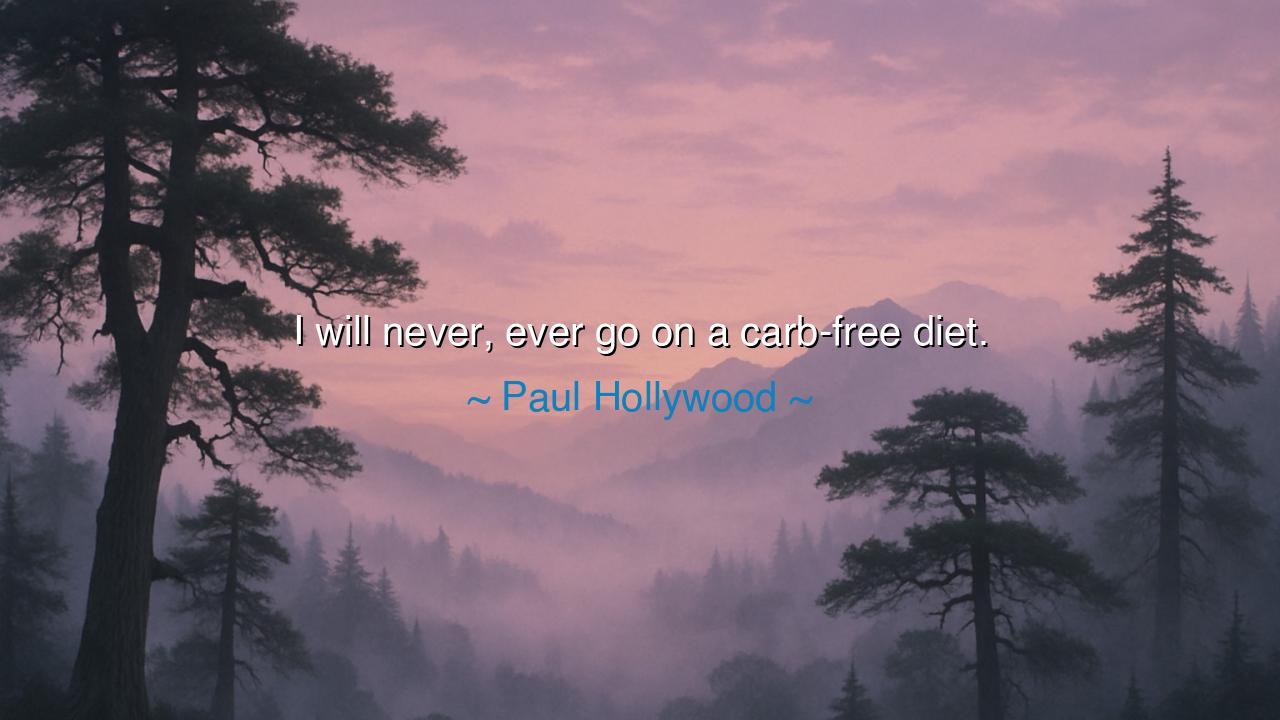
I will never, ever go on a carb-free diet.






In the bold declaration of Paul Hollywood — “I will never, ever go on a carb-free diet.” — there lies not rebellion, but reverence. These words are not the cry of indulgence, but of remembrance: a reminder of the sacred bond between bread and humanity, between nourishment and joy, between discipline and delight. For in this age of fleeting fads and self-denial masked as virtue, Hollywood’s voice rises like the crack of a baker’s loaf emerging from the oven — warm, fragrant, and timeless. He speaks for the ancients, who knew that food was more than fuel — it was communion, a living poetry of the earth.
The origin of such a statement can be traced to the dawn of civilization itself. When the first grains were gathered and crushed beneath stone, when fire first kissed dough and transformed it into bread, humanity took its first step from survival into culture. The Egyptian bakers, the Greek millers, the Roman hearth-keepers — all saw in carbohydrates, the humble grain, the essence of life’s endurance. Bread became sacred; it was the food of gods and peasants alike. To break bread was to share existence, to affirm that life, though simple, was beautiful. In that sense, when Hollywood rejects the carb-free doctrine, he is not rejecting restraint — he is protecting something older than history: the soul of nourishment.
Think of the story of Jesus of Nazareth, who broke bread with his disciples and said, “This is my body.” It was no idle metaphor. It was an acknowledgment that bread, simple and universal, is the symbol of connection between flesh and spirit. A world without bread — a carb-free world — would be one without communion, without memory, without the warmth of shared sustenance. Hollywood’s defiance, then, is not gluttony, but a stand for humanity itself. It is the refusal to strip joy from the act of eating, the refusal to let modern obsession with control sever us from the comfort of tradition.
To eat bread, pasta, grain, or any fruit of the field is to partake in the rhythm of the seasons. The wheat grows tall under the sun, is cut down by the scythe, ground by stone, kneaded by hand, baked by fire. Every loaf carries within it the labor of earth and man alike. When one denies this chain by forswearing the carb, one forgets the ancient covenant between effort and reward, between patience and creation. The baker, much like the philosopher or the poet, transforms the ordinary into the sublime. Paul Hollywood, a man of the oven and the hand, honors this sacred craft with his words. In the simplicity of his stance is profound wisdom — the body and the spirit both crave what is real, not what is forbidden.
There is, too, an emotional truth hidden within his defiance. The ancients knew that joy, taken moderately, is a virtue. The philosopher Epicurus taught that pleasure, when balanced and grateful, leads to tranquility. But denial for its own sake, denial that forgets gratitude, breeds bitterness. A carb-free diet, in its extremity, symbolizes a greater error of our time — the belief that purity lies in deprivation. Hollywood’s statement rejects this illusion. To eat bread is not to fall into sin; it is to embrace the fullness of life — the aroma, the warmth, the community that sustains the soul as much as the body.
Consider the French Revolution, where the people cried not for luxury but for bread. “Give us bread!” they shouted — not jewels, not silks. Bread is the measure of life itself. When the body hungers, it does not crave perfection; it craves sustenance. So too does the heart hunger — not for the sterile pride of restriction, but for the wholesome satisfaction of being in harmony with creation. Hollywood’s words carry the echo of those cries — the eternal truth that a fulfilled life cannot be lived on denial alone.
Let this then be the lesson to those who hear: beware the chains of false purity. To live well is not to deny, but to discern — to eat with reverence, to partake with joy, to give thanks for what sustains. Bread is not the enemy; it is the ancient ally of humankind. The path to health, strength, and wisdom lies not in exile from the table, but in balance, in gratitude, in awareness of what we consume and why.
Therefore, break bread each day as your ancestors did. Savor it. Share it. Let its warmth remind you that life, like bread, is best when leavened with joy and tempered with patience. And remember, as Paul Hollywood reminds us, that to love bread — to honor the carb — is to love life itself. For no man can live long without sustenance, and no soul can thrive without joy.






AAdministratorAdministrator
Welcome, honored guests. Please leave a comment, we will respond soon